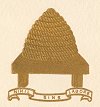 |
Ralph and Jordan
(J. A. Jordan & Sons Ltd)
Beehive Works, Earl Street, Bilston
|
 |
A brief history by Reg Aston
Records indicate that the company was established about 1870. There
are mentions in a Post office Trade Directory of 1872 of a James Ralph &
Company, frying pan maker of Earl Street, Bilston. In 1896 Kelly's
Directory for Staffordshire lists both James A. Jordan, holloware; and
Ralph & Jordan, wrought iron, holloware manufacturer, tinners,
galvanisers and manufacturers of enamelled iron advertisement plates,
Beehive Works, Earl Street, Bilston.
In 1893, in his History of Bilston, Lawley has this to say about the
company:
A position of the greatest importance in the industrial circles of
Bilston is held by the establishment of Messrs. Ralph & Jordan,
Beehive Works. They are manufacturers and patentees of Tinned and
Galvanized Wrought Iron Hollow-ware, and makers of ‘Alpine’ high
class Cycles. Their works are advantageously situated and are of
modern and substantial construction. They cover altogether about an
acre and a half of ground, and are divided into different
departments suitable to the business, viz., large tin and
galvanizing shops, finishing shops, warehouses for show, stock,
packing and sorting rooms and offices, etc. The ranges of shopping
are replete throughout with every description of machinery of the
best type and improved appliances. Nearly two hundred hands are
employed. Messrs. Ralph & Jordan are also makers of The Universal
Enamelled Iron Goods, a new industry for Bilston, and the only one
of its kind in the township.
Unfortunately nothing more is known of their bicycle making
activities. Although they may have continue for some years as
makers of holloware, vitreous enamelling became their main activity.
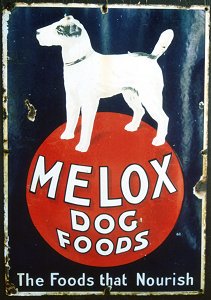
Sign by Jordans, photographed in situ. |
The processes involved in enamelling were not
without its dangers to the employees.
On 12th June 1893 Harriet Walters of Sedgley died an
agonising death. The Coroner returned a verdict of "Death
from chronic lead poisoning accidentally contracted through her
employment". Five months prior to her death she had been
earning her living as a "brusher" at Ralph & Jordan enamelling
works.
The verdict was greeted with so much protest that eventually
questions were asked in Parliament which resulted in the setting
up of a special committee to investigate the enamelling industry
in general. |
The company's main business was the production of enamelled
advertising signs. A full colour catalogue issued in 1918 proudly
displayed signs produced for some of the most well known national and
local companies, including Wearwell Cycles, complete with its winged
wheel logo.
| Trade directories of 1924 indicate that by this
time the company had become known as J.A. Jordan & Sons Ltd. The
following decades showed expansion with the building of
additional premises, with one side of Earl Street dedicated to
the enamelling of gas cookers, while the other side looked after
enamelled signs of all shapes and sizes, including bus stop
signs, road signs, signs for tea, chocolate and cigarettes.
Almost certainly the "Players" cigarettes advert was the most
famous with the "Sailor" design recognised everywhere. |
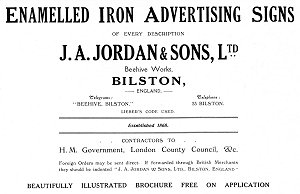
An advert from a trade
directory of 1920. |
|
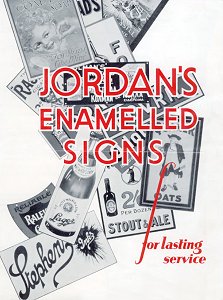
An advertisement, undated. |
Some designs were indeed a work of art and they
employed artistic designers to produce this type of sign.
A stencil was cut for each colour which was applied and
fired separately. The mixing of the correct proportion of the
various ingredients to produce each colour was critical, as was
the ability to withstand repeated firings.
It is said some of the secrets of the trade were lost when
key important employees retired taking their "recipes" with
them. This would, no doubt, have added to the decline in
the company's fortunes but the firm's work with vitreous enamels
was supported by chemists and laboratories in Greencroft. |
| During the 1950s and 1960s the firm diversified
into the wind rotating advertising signs that normally appeared
on garage forecourts and into station name plates for British
Rail.
The brochure (of which the front cover and one inner page are
shown to the right), undated, probably from the late 1950s,
shows signs for British Rail, international companies such as
National Benzole, HMV and Coca Cola and a local company, Midland
Counties Ice Cream.
|
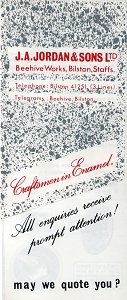 |
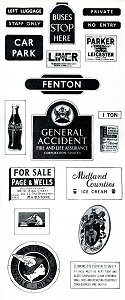 |
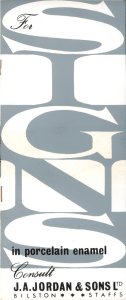 |
Although Jordans continued to be most famous for
their advertising signs, they continued with other enamelling
work, which included the enamelling of the type of cast iron
fireside furniture best represented by the Bilston Knights.
Their entry in the 1974 Wolverhampton Official Handbook
says: "Vitreous enamelling of steel and cast iron.
Manufacturers of architectural panels. Press work capacity
up to 350 tons, spot welding undertaken". The "architectural
panels" were fire resistant panels used on the facades of large
buildings. |
On the following pages there are many examples of
Jordans work taken from a number of documents, particularly a surviving
catalogue. (Thanks to the Black Country Living Museum for
providing scans of most of the documents shown, from their archives).
|








